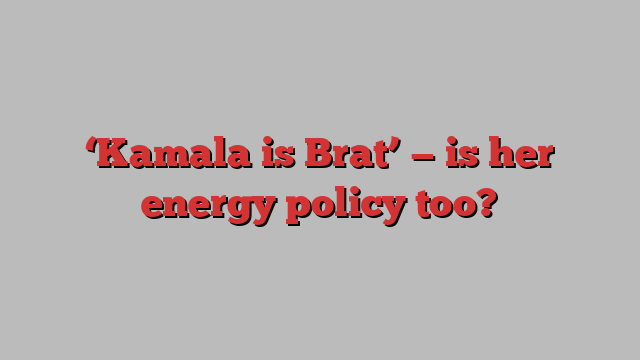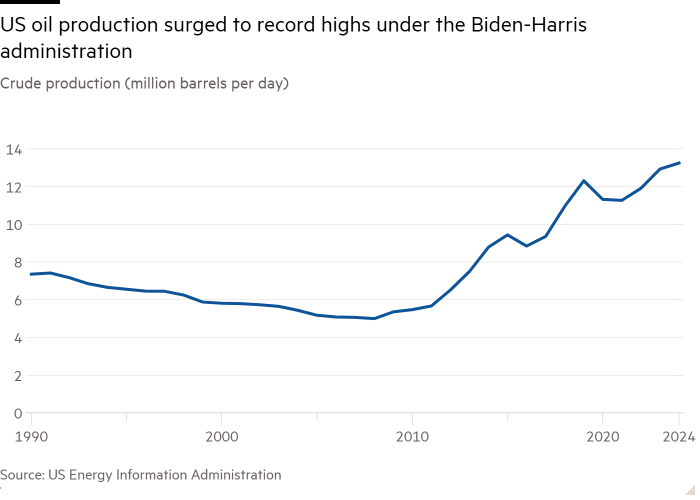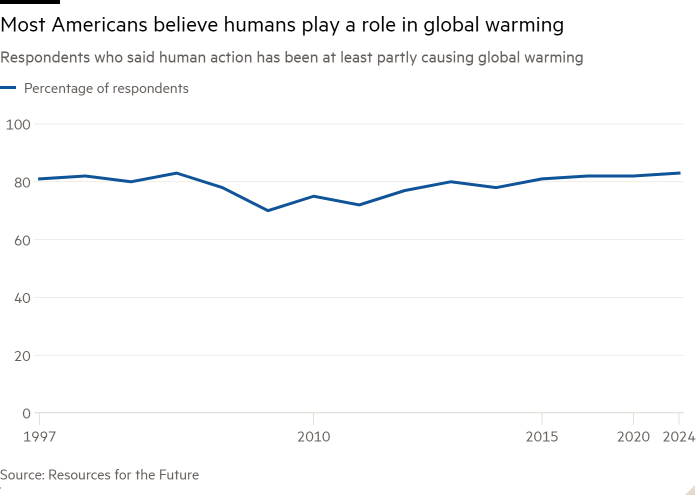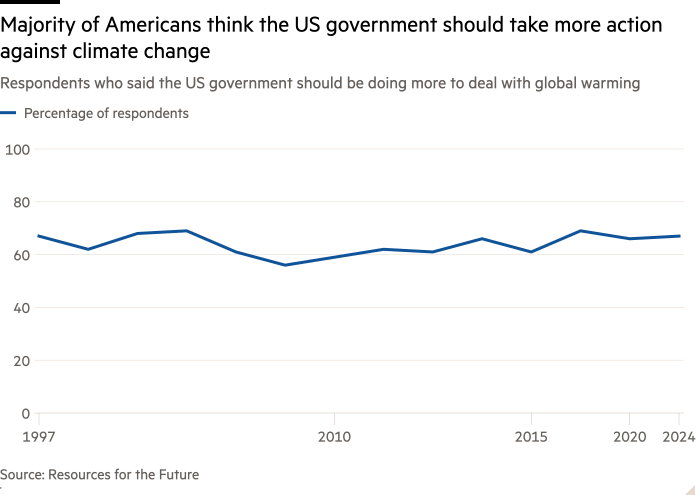
This article is an on-site version of our Energy Source newsletter. Premium subscribers can sign up here to get the newsletter delivered every Tuesday and Thursday. Standard subscribers can upgrade to Premium here, or explore all FT newsletters
Good morning and welcome back to Energy Source, coming to you from New York.
It’s been a turbulent week in US politics, with President Joe Biden stepping down from his campaign for re-election and endorsing vice-president Kamala Harris for the Democratic presidential nomination.
Today’s Energy Source dives into what a Harris presidency could mean for US energy policy. The VP has endeared herself to Gen Z, who are posting viral clips of the candidate with tracks from Charli XCX’s album Brat. But whether Harris can deliver what young voters want on climate is questionable.
In our second item, Rhea Basarkar looks at how Republican nominee Donald Trump’s rhetoric on climate change is out of step with the American public.
Lastly, the FT has a Big Read out this morning on the future of Texas. The Lone Star state has expanded its reputation over the past decade from an oil and gas producing state into a corporate mecca. But strains are starting to show.
Thanks for reading,
Amanda
Can Kamala make US energy policy ‘Brat’?
Kamala Harris’s sudden vault to the top of the Democratic presidential ticket has triggered a rush to figure out where she stands on the crucial election issues.
But as analysts and journalists comb through her record, on energy she remains something of an enigma.
On one hand environmental groups say she has the opportunity to distinguish her platform from that of President Joe Biden and re-energise young voters who have become disillusioned with the White House on issues such as climate and Israel’s war in Gaza.
“Kamala Harris has the opportunity to be a historic nominee and put forward a strong vision to make the economy work for everyday people and ensure a liveable future for us all,” said Denae Ávila-Dickson, a communications manager for climate activist group, the Sunrise Movement, told Energy Source. “She should seize that opportunity.”
The youth-led group has not endorsed Harris, the favoured Democratic nominee, but a number of environmental groups have, including the Sierra Club and the League of Conservation Voters Action Fund.
The vice-president has become the meme of the moment this week, as young voters remix her eccentric remarks with British pop star Charli XCX’s album of the summer, Brat. Whether she can hold Gen Z’s attention as she shows her cards on energy is another matter.
Evidence of stronger climate action from Harris dates back to her shortlived 2020 presidential campaign, where she veered to the left of Biden, vowing to ban fracking and end the filibuster to pass the Green New Deal. Even earlier, as California attorney-general, Harris launched an investigation into ExxonMobil and filed lawsuits against oil companies including Chevron and ConocoPhillips, an action she may pursue if elected president.
“[A Harris presidency] is probably going to be more progressive than Biden’s,” said Mona Dajani, global co-chair of Baker Botts’ energy practice, who expects Harris to advocate more for climate and environmental justice.
On the other hand, much has changed in the energy landscape since Harris’s 2020 run. Russia’s war in Ukraine exposed Europe’s energy vulnerabilities and put a spotlight on the US role as a gas exporter. The US, meanwhile, is producing more oil than ever, helping buoy prices as tensions escalate in the Middle East. The Inflation Reduction Act, for which Harris delivered the tiebreaking vote, recognised that the US must swiftly decarbonise but not at the expense of relying on China. And legally, a conservative Supreme Court has severely limited what federal agencies can do to regulate pollution.

Harris will face the same balancing act as Biden when crafting energy policy if she wins in November: how to keep energy costs down while accelerating the country’s progress on climate and ensuring good-paying jobs at home. This could temper her campaign’s ambitions on climate, which is likely needed if Harris wants to win critical swing states such as Pennsylvania, the country’s second-largest gas-producing state.
Paul Bledsoe, a former climate adviser to the Bill Clinton administration, told Energy Source: “Harris’s view of energy policy has expanded and deepened while she’s been vice-president. For example, it is clear that she no longer supports a ban on natural gas hydraulic fracturing . . . that’s a natural evolution to a more realistic view of US energy and climate policy.”
What would likely come out of a Harris presidency is the continued Biden administration effort to green the country’s economy through existing policies like the IRA, participation in international climate efforts and by cracking down on polluters and Chinese clean tech imports. Limited federal lease sales for drilling is also likely over a full ban, said analysts.
Who Harris picks as her running mate will be a good indicator of whether her platform will cater to young climate voters or fossil fuel moderates. Two of her most-favoured VP picks — governors Josh Shapiro of Pennsylvania and Andy Beshear of Kentucky — come from fossil-fuel rich states. Shapiro has been a vocal critic of Biden’s freeze on new liquefied natural gas permits, a pause that is up in the air.
“If you look at her voting record in the Senate, it comes across a lot more liberal than I would probably expect her to govern as a president,” said Glenn Schwartz, director of energy policy at Rapidan Energy Group. “The Democratic strategy right now is to appeal to moderate swing voters, rather than try to cater to their more aggressive green base.” (Amanda Chu)
Trump’s views on climate are out of step with American public
Republican presidential nominee Donald Trump and his running mate JD Vance have repeatedly played down the threat of climate change and its human causes.
“Can you imagine, this guy says global warming is the greatest threat to our country?” Trump asked the crowd at his Virginia rally last month, referring to Biden. In his 2022 senatorial campaign, Vance said he was “sceptical of the idea that climate change is caused purely by man”.
But new polling from Resources for the Future shows this rhetoric on climate is out of step with the beliefs of most Americans.
More than three in four Americans believe global warming will be a “very or somewhat serious problem” in the US if nothing is done to reduce it, according to the report. Meanwhile, more than 80 per cent of Americans believe human action has “at least partly” been causing global warming.

The majority of Americans also believe the US government should be doing more to combat global warming, with 67 per cent of respondents supporting this view, the report said.
The calls for aggressive action on climate come as Trump vows to terminate President Biden’s landmark climate policy if elected in November.
“They’ve spent trillions of dollars on things having to do with the green new scam,” Trump said at the Republican National Convention last week. “It’s a scam that’s caused tremendous inflationary pressures.”
Biden has taken more action to address climate change than any other administration. Still, the US is projected to fall short of its 2030 Paris accord emissions reductions goals, as reported by our colleagues earlier this week. (Rhea Basarkar)

Job Moves
-
Vale appointed Shaun Usmar as chief executive of its base metals business, succeeding Deshnee Naidoo, who stepped down in March. Usmar previously served as chief financial officer at Barrick Gold and most recently was founder and CEO of Triple Flag Precious Metals.
-
Tarik Skeik will join LNG developer NextDecade as chief operating officer, succeeding Ivan Van der Walt. Skeik joins the company after more than a decade at ExxonMobil, where he led global projects.
-
Austin-based FTC Solar named Yann Brandt as its chief executive, replacing Sean Hunkler, who left in November. Brandt joins from battery developer FlexGen, where he served as chief commercial officer.
-
Battery recycler Li-Cycle appointed Craig Cunningham as its permanent chief financial officer succeeding Debbie Simpson. Prior to Li-Cycle, Cunningham served as CFO at Electra Battery Materials.
Power Points
Energy Source is written and edited by Jamie Smyth, Myles McCormick, Amanda Chu, Tom Wilson and Malcolm Moore, with support from the FT’s global team of reporters. Reach us at [email protected] and follow us on X at @FTEnergy. Catch up on past editions of the newsletter here.
Recommended newsletters for you
Moral Money — Our unmissable newsletter on socially responsible business, sustainable finance and more. Sign up here
The Climate Graphic: Explained — Understanding the most important climate data of the week. Sign up here